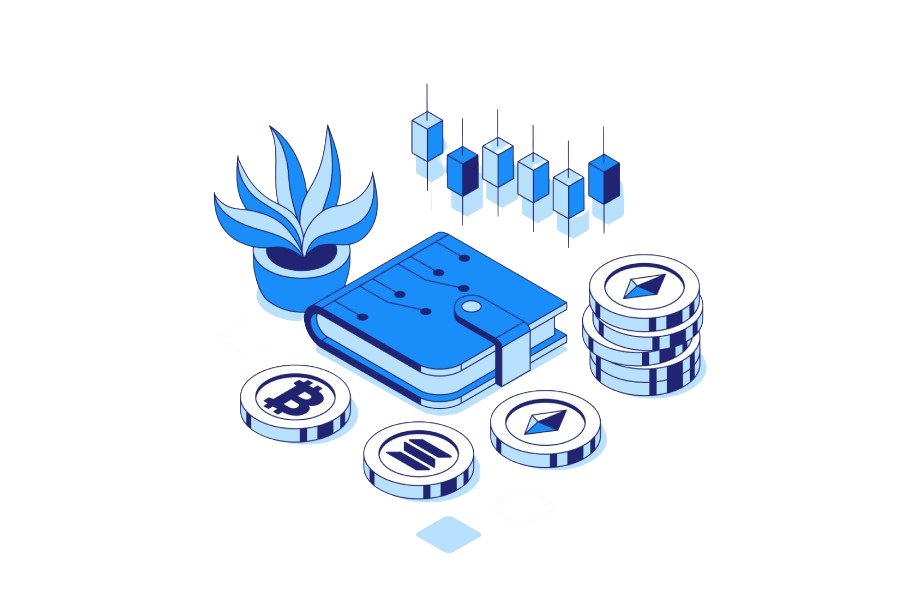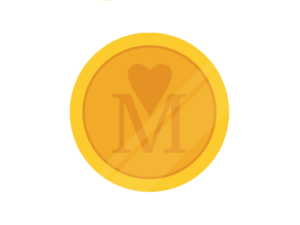What is a crypto wallet?
Cryptocurrency wallets are digital tools that allow users to store and manage their coins, tokens, and other digital assets. They come in different forms such as hardware wallets, mobile wallets, paper wallets, and web-based services. In this article we will discuss how cryptocurrency wallets work, the different types of crypto wallets available, we’ll even talk you through setting up a wallet step-by-step, and why it is important to keep your recovery phrase safe!
Table of Contents

Key Takeaways
- Cryptocurrency wallets are digital tools that enable users to store and manage their coins, tokens, and other digital assets.
- Different types of wallets exist such as hardware wallets, desktop wallets, mobile wallets, paper wallets, and web-based services.
- A cryptocurrency wallet operates in a manner similar to traditional online banking: a blockchain serves as the bank and public keys are akin to the bank account numbers. Private keys serve as the login credentials for accessing funds.
- It is important to use compatible wallet addresses when sending/receiving cryptocurrency and keep private keys secure.
- Types of crypto wallets include hot (online), exchange (online) and cold (offline/hardware).
- Maintaining the security of your recovery phrase is essential - never give it away or store it online or on any device connected to the internet.

Introduction
If you’re looking for the short version and you just want a safe and convenient wallet that allows you to manage your own funds, buy and sell, and with bulletproof security, then you can head straight to our wallet page and pick up the Coinmama Wallet. It’s got everything you could possibly need and, as a bonus, we’ll run through a step-by-step guide on how to set it up below. Spoiler alert: it’s super-easy.
If you want to learn a bit more about crypto wallets and how they work, read on!
So How do Cryptocurrency Wallets Work?
Instead of thinking of a wallet in the traditional sense, where cash is actually inside of your wallet or your credit cards actually being inside of your wallet, a better way to think about a cryptocurrency wallet is as a key to access your funds.
Let’s run through an analogy to help us wrap our heads around how cryptocurrency wallets work. A simplified way to understand how cryptocurrency wallets work, is to consider how your traditional online banking applications work. Imagine your bank is the blockchain, your bank account number is the public key, your crypto wallet is your online banking app, and your online banking app login credentials are your private key.
So, your bank records and tracks all of the transactions going to and from your bank account, just like the blockchain records and tracks all of the transactions going to and from your public key. Using your online banking app, you are able to check the balance of your bank account and send or receive transactions, just like a cryptocurrency wallet allows you to check your balances and send or receive crypto.
However, in order to login to your online banking app, you need to first type in your username and password, which is like using your private key to access your cryptocurrency wallet. A public key is similar to your bank account number, in that if you provide anyone with your bank account number, they can send you funds. Keep in mind that public keys are also commonly known as “wallet addresses.”
Note that having your bank account number alone would not allow someone to take funds from your account. This is also how a public key works – people can send you cryptocurrency using your public key or public wallet address, but they cannot take funds from you using your public key.
Giving your online banking app login credentials to someone,however, would allow them to send funds from your bank account to somewhere else. This is similar to a private key – if you give someone your private key, they can access your cryptocurrency and send it somewhere else.
Unlike traditional banking, if you give away your private key and your funds go missing, you will likely not be able to recover them. This is why it is so important to keep your private key private.
Using compatible wallet addresses
Before sending and receiving cryptocurrency, you must first make sure you are sending the same type of currency to a wallet address, or public key, that supports that particular cryptocurrency. For example, you can only send bitcoin to bitcoin addresses and you can only receive ether from ether addresses. If you have another person’s public key, or address, you can easily send them some corresponding cryptocurrency. And vice versa.
When cryptocurrencies are sent or received, no actual physical or digital exchange occurs between the wallets. Remember, cryptocurrency wallets interact with the blockchain and the blockchain is where all cryptocurrency transactions are logged. And it’s also where balances are tracked.
So, just to recap, a cryptocurrency wallet has software that interacts with the blockchain, stores your public and private keys, monitors your cryptocurrency balances, and allows you to send and receive cryptocurrency.
How to Use a Crypto Wallet?
Different wallet applications have specific guidelines for creating a wallet. For this article, we will consider a mobile wallet.
- First, download and install the app for your desired wallet application from the app store on your device— Play Store for Android, App Store for iOS.
- Launch the app and follow the prompts to create a wallet. Write down your private keys and store them somewhere safe.
- You can now buy your favorite cryptocurrencies on an exchange or with your debit or credit cards.
- Use your public keys to receive crypto payments, and do not give out your private keys to anyone, no matter who they claim to be.
Crypto wallets are one of the tools you must know how to use when interacting with the blockchain. Several wallet apps have help forums where you can seek help if you are ever confused by anything. Find the best crypto wallets for you and start storing your favorite coins.
What are the different types of Cryptocurrency wallets?
There are many different types of cryptocurrency wallets to choose from and each of them have their own pros and cons. Let’s take a look at some of the different options.
Hot wallets
A hot wallet creates and stores your private keys online, while cold wallets create and store your private keys offline. Examples of hot wallets include desktop or mobile app software. These wallets operate on your computers and cell phones, which are connected to the internet. So, when you set up these wallets, your private key is generated on a “hot” device, which just means it’s connected to the internet, which could be more vulnerable to being compromised.
Exchange wallets
By far the least secure way to store large investments in cryptocurrency for the long term is on an exchange. Why? Well, first of all, it’s online, therefore hot, therefore more vulnerable to hacks. And on top of it, cryptocurrency exchanges are HUGE targets for hackers since obviously there’s a ton of potential crypto that can be stolen. With any regular wallet any of us manage on our own, a hack has no idea how much potential loot there is to steal. While crypto exchanges are a guaranteed gold mine of sorts. And as if it couldn’t get any more sketchy, cryptocurrency exchanges rehypothecate crypto, and without going into too much detail breaking that down, basically it means that one ether you are looking at in your account, could also be the same ether 5 other people on the exchange are looking at. Meaning cryptocurrency exchanges don’t actually have all of the crypto backed one-to-one for all of their customers. So if there was a massive run on exchanges where everyone wanted to move their bitcoin and ether to their own wallet, there would not be enough to go around. Yeah, scary. So learn about the safest, most ideal way to store significant amounts of cryptocurrency for the long term. Cold wallets.
Cold wallets
Cold wallets are sometimes referred to as hardware wallets. Hardware wallets are designed to safely create and store your private keys offline. When sending, receiving, or managing funds, you will need to use the hardware device and go through more security steps, in general, making your funds less vulnerable to theft.
By creating and storing private keys with hardware wallets, your funds are safer from hackers and other potential security risks associated with hot wallets. Storing your cryptocurrency on a hardware wallet is the safest, most secure way to manage your funds.
Note there are two important things you need to know about buying a hardware wallet. First, only buy hardware wallets from the real manufacturer. Do not buy used hardware wallets and do not buy from other companies and individuals. This is because hackers may buy a hardware wallet, tamper with the software, and resell the hacked device to steal your funds.
Secondly, as with all crypto related activities, make sure you double and triple check the URL you are accessing to buy the hardware wallet. Make sure the address is correct and that it has an SSL (secure sockets layer) which uses the https protocol, instead of http. There are a ton of phishing scams online that pretend to be the real website you intend to access. If you access a fake website, you may lose your funds or receive a hacked wallet.
The importance of your recovery phrase
The importance of your recovery phrase (aka seed phrase) cannot be overstated.
To illustrate, let’s pretend someone gets their hands on your 12 words. Just your 12 words. Not your phone, not your email address or passwords, or anything that has any connection with you at all. If someone gets their hands on a piece of paper with these 12 words, they can steal your crypto very easily. How? You’ll be shocked how easy this is.
Download your Coinmama Wallet just like we did in the example above. Open the app, but instead of choosing to “Create New Wallet,” select, “Import wallet”. Then, enter the 12 words. Tap “Import”. Et voila!
Stealing someone’s crypto really is that simple once you’ve got their seed phrase. These 12 words are the key to your crypto. Literally. Never forget that.
Crypto Wallet FAQs
Are Crypto Wallets Free?
It depends on the wallet. Generally speaking, hardware wallets tend to be expensive whereas software wallets are often free. If you’re looking for a wallet that’s extremely secure, easy to use, and won’t cost you a cent, check out the Coinmama Wallet.
Can I Switch Crypto Wallets?
Yes, you can switch crypto wallets any time you want. For example, if you want to switch from your existing wallet, to the Coinmama Wallet, you simply download the app and follow the simple instructions to import your wallet along with all your existing crypto. Simple! 😀
Should You Keep Your Crypto In A Wallet?
Yes, you should absolutely keep your crypto in a wallet. Wallets provide users with unparalleled security, convenience, and control over their funds. With a wallet, you are the only one who has access to your crypto. Need a crypto wallet? Check out the Coinmama Wallet. It’s absolutely





